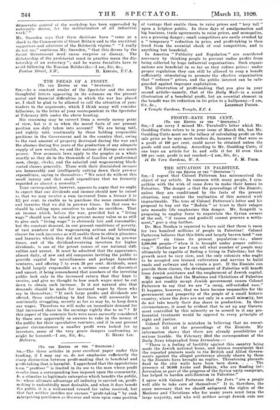[To THE EDITOR OP THE " SPECTATOR.] "im,—The three articles
in your excellent paper under this heading, if I may say so, do not emphasize sufficiently the sharp distinction between profit-making that is beneficial and profit-taking that is harmful. I apprehend that the opprobrious term "profiteer" is limited in its use to the man whose profit results from a corresponding loss imposed upon the community. A: a stimulus to legitimate enterprise which benefits the public, for whose ultimate advantage all industry is carried on, profit- m iking is undoubtedly most desirable, and when it does benefit the public it is a well-earned reward for value received, but that fact neither justifies nor excuses " profit-taking " by such enterprising gentlemen as discover and seize upon some position
of vantage that enable them to raise prices and " levy toll " upon a helpless public. In these days of amalgamation and big business, trade agreements to raise prices, and monopolies, are a pressing danger; small competitors are easily crushed by a " temporary " reduction in price, and profit-taking is then freed from the essential check of real competition, and is anything but beneficial.
In America " Publicity and Regulation " are considered necessary by thinking people to prevent undue profits from being collected by huge industrial organizations. Such organi- zations are beneficial in so far as they reduce prices : under proper regulation they can still be allowed to reap a benefit sufficiently stimulating to promote the effective organization that " reduces" prices, and the public interest can be safe- guarded against improper exploitation.
The illustration of profit-making that you give in your second article—namely, that of the Daily Mail—is a sound illustration of a beneficial profit, but an essential element in the benefit was its reduction in its price to a halfpenny:—I am,










































 Previous page
Previous page